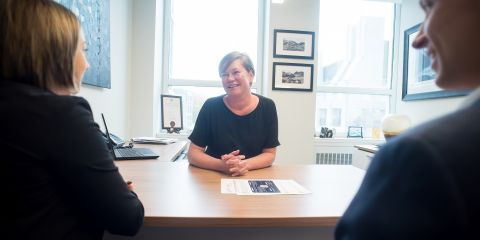
When students think of law school, they naturally think of its courses: learning from top minds in the classroom and online, diving deep into statutes and cases to learn the law and how it functions.
There's a second strata to a law school education, however: understanding the work of law, and preparing oneself to succeed at it. Finding meaningful work after law school is a key part of the contemporary school experience. Fortunately for Queen's Law students, the law school has a dedicated resource to help them do just that.
Second-year law students have just completed the Toronto On-Campus Interview process, a full-day event that sees dozens of recruiters meeting with law students in Kingston to place them in summer jobs, and later articling positions, at law firms.
"This event is just one of many recruitment opportunities available to Queen’s Law students.” says Julie Banting, Director of the Queen’s Law Career Development Office. "There's no disputing that this is a stressful time for students! We help them manage that stress by ensuring they’re well prepared – a process that begins in first year. The feedback we get from recruiters about our students, and how ready they are for these interviews, is consistently very positive."
That feedback is borne out in the school's placement statistics: Queen's Law continues to trend upward in career placement year over year. 2017 saw 95.4% of graduating students finding careers by September, up from previous years and over 95% for the second year in a row.
"Being ready to find your path, and succeed in it, is essential," Banting says. "A core aspect of our programming is the understanding that there are many careers that don't involve large law firms, and a number of our students don't necessarily see Bay Street as the best fit for them. We do well at finding jobs in 'big law' for the students who think that's the right fit, but also excel at having students land in other areas from small to mid-size firms, government, in-house and public interest"
It's no small feat and is supported by the robust programming the CDO offers Queen's students to expose them to all aspects of law. October 23 saw the introduction of another year of Osler BizBasics, an overview of business fundamentals in law. Wednesday, October 24 brings a visit from Queen's Law alumni Susan Charlesworth, Law'81, now a judge at the Nunavut Court of Justice, to talk about career options in public service and northern Canada. On November 1, the Faculty is subsidizing student attendance at the Canadian Conference on International Law, a vital way for students to learn about global practices.
"That's just a couple of weeks," Banting smiles. "The office hosts a series of sessions designed to give students fundamental skills in career development, panels with guest speakers that provide career exploration opportunities, networking events, shadow and mentoring programs, peer mock interview sessions, to name just a few things -- it is an all-year service."
One of the foundations of our service is access to one-on-one counseling: Banting, and full-time career counselor Mike Molas, see hundreds of students a year, providing advice on everything from how to craft a post-interview thank you note to how to ask yourself the big questions about what your future looks like. “The other foundation is maintaining and expanding relationships with core employer partners and alumni,” Banting says. “Jenny DeBruyn, our Career Development Coordinator has been critical to this expansion, and we’re gratified to see dedicated alumni ‘paying it forward’ by supporting current students on the path to success.”
The variety of alumni that support the program help underscore and support the CDO’s dedication to finding a good fit for the students that pass through its doors. "Many students come into law school with an idea of courtroom or corporate law that they've learned from the media, and are immediately exposed to an entire world of legal specialties, options and potential directions,” Banting explains. “Beginning in their first year, we work with them to focus on self-assessment and career exploration to help them understand the variety of options available with a law degree.”
“Law presents opportunities that fit every student,” she says. “Helping them understand what they want as well as preparing them to achieve it, is really at the heart of what we do.”